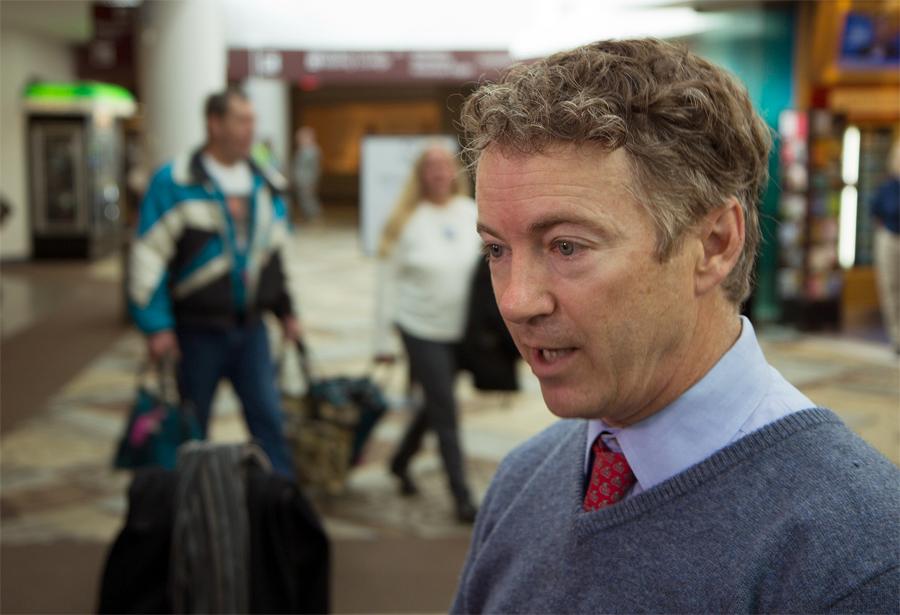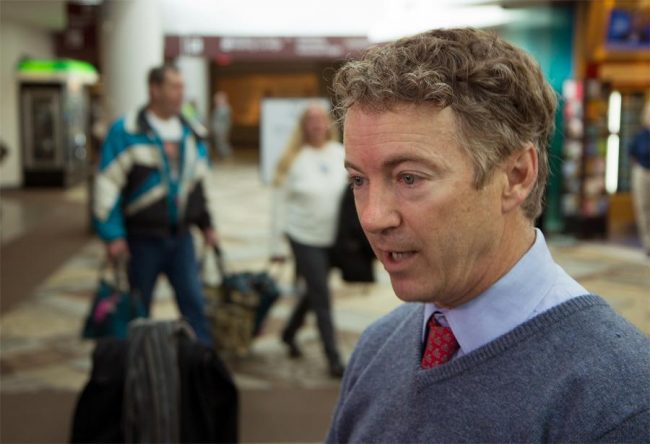
U.S. Sen. Rand Paul speaks about being stopped by security at the airport in Nashville, Tenn., on Monday. A scanner set off an alarm and targeted his knee, although the senator said he has no screws or medical hardware around the joint. He said he was “detained” in a small cubicle and couldn’t make his flight. (Associated Press)
The Transportation Security Administration (TSA) detained a U.S. Senator over his refusal to consent to a full body pat down on Monday. When a full body scanner alerted federal TSA agents that Senator Rand Paul’s knee was a threat to airport security, Sen. Paul lifted his pant leg and showed that there was nothing there.
Despite this, Paul was escorted to a 10-foot-by-10-foot cubicle reserved for potential terrorists.
He offered to restart the screening process to show that the scanner had made a mistake, but the TSA agents denied his request and demanded to touch and pat down Sen. Paul.
Upon refusing the pat down, which he saw as a violation of his civil liberties and the Fourth Amendment, TSA agents gave Paul the option of either submitting or being denied access to the airport.
This is far from the first time the TSA has overexerted its authority. In June of last year, a 95-year-old woman who weighed barely 100 pounds in a wheelchair was humiliated by being asked to remove her adult diaper to go through security.
Former Miss USA Susie Castillo accused an agent of molestation while going through Dallas/Fort Worth airport security.
Castillo was taken to a closed room where she said, “The agent ran her hands down my behind, felt around my breasts, and even came in contact with my vagina… The TSA employee at DFW touched [my] private area four times.” Other examples of TSA abuse are not hard to find with a simple Internet search.
According to its own website, the TSA was created in the wake of 9/11 to “strengthen the security” of airports. The passage of the Aviation and Transportation Security Act supposedly made air travel much safer than it would have been had the government not stepped in.
People demanded security in airports, yet instead of allowing the free market to meet this demand by creating a private supply of security — as many private nuclear reactors or money transport companies currently have — the federal government nationalized airport security. Many people found no qualms in their own federal government absorbing responsibilities of airport security.
They sacrifice their liberty for the sake of security; Benjamin Franklin would be ashamed at what we’re putting up with. Some go as far as to describe the TSA as a violation of the Fourth Amendment, which prohibits the federal government from unreasonable searches without warrants or probable cause.
Yet more controversial is whether or not the TSA does in fact increase our security.
No government agency can really care about the bottom-line of security, nor does bureaucracy respond to the profit motive. In a free market, if consumers refused to fly on planes due to fear of the plane being hijacked, would the airlines not fund private security in order to retain customers?
Would DFW and Love Field not compete over which airport has a superior security system and therefore win the hearts and wallets of the people of the greater Dallas area?
If DFW became notorious for violating women during their screenings, would it not lose business to a more sensible form of security found in Love Field or even fire the entire private security contractors and hire new, sensible ones?
In the current environment where all responsibility of security can be relinquished to the government, airlines have no responsibility in keeping their passengers safe from dangerous people who pose legitimate threats to their passengers.
Perhaps this is exactly how airlines would want it, for they cannot be held accountable for dangerous people who board their flights.
Real security can be achieved in the private market, and it is time we admit that the TSA is a blithering behemoth of bureaucratic failure.
Richard is a sophomore majoring in political science.









